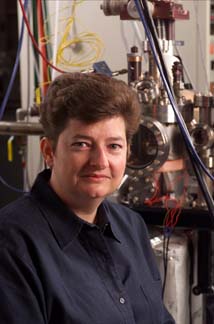Hines to head materials research center as NSF funding is renewed for six years
By Bill Steele
Melissa Hines, Cornell University professor of chemistry and chemical biology, has been named director of the Cornell Center for Materials Research (CCMR). The appointment was announced Oct. 7 by Joseph Burns, vice provost for physical sciences and engineering, just two days after the National Science Foundation (NSF) announced renewed funding for the center for the next six years.
Hines succeeds Frank DiSalvo, the J.A. Newman Professor of Chemistry and Chemical Biology, whose five-year term as director ended Sept. 1.

"Melissa Hines, a very capable materials chemist, has significant experience on CCMR's Executive Committee representing one of the research areas," Burns said. "She has ably led the Research Experience for Undergraduates and is superb at public outreach. I am confident that CCMR's future is in good hands for some time to come. Melissa will lead CCMR with vision and vigor."
Hines' research focuses on chemical processes used in nanofabrication. She seeks ways to use chemical etching to create atomically flat surfaces and features smaller than those that can be made with conventional photolithography. She is co-leader, with physics Professor Jeevak M. Parpia, of an interdisciplinary research group (IRG) studying the behavior of nanomechanical devices.
Hines' work is typical of CCMR research, which focuses on new ways to synthesize, characterize and understand interfaces and surfaces at the atomic and molecular scales. Its work is done by several IRGs drawn from approximately 100 faculty members in 10 Cornell academic departments.
Primary funding comes from the NSF Materials Research Science and Engineering Centers Program. Under the renewed grant, CCMR will receive $18.28 million over the next six years. Other significant funding comes from the New York State Office of Science, Technology and Academic Research; U.S. Department of Education; other divisions of the NSF; and from industrial partners. The center reports directly to the Office of the Vice Provost for Research, and its membership spans the College of Arts and Sciences and the College of Engineering.
Researchers have access to extensive shared facilities on campus, providing such services as electron microscopy, ion beam analysis, polymer characterization and X-ray diffraction, and a dedicated parallel cluster supercomputer operated by the Cornell Theory Center.
The center supports an exceptionally strong education program for grades pre-K through 12, undergraduate and graduate students, and the public. A full-time outreach staff of three, all former teachers, manages eight teacher programs and 15 community programs, and sends faculty, staff and graduate and undergraduate students to teach in pre-kindergarten through high school.
An important goal of the center is to show students that involvement with the public is a basic responsibility of every scientist and engineer. The center has supported the weekly "Ask a Scientist" column in the Ithaca Journal since 1999.
Media Contact
Get Cornell news delivered right to your inbox.
Subscribe